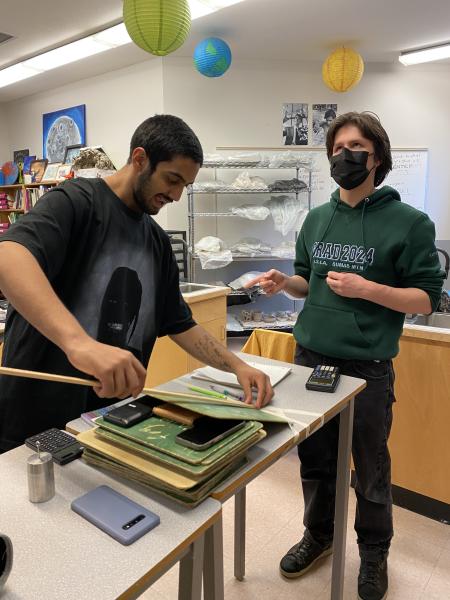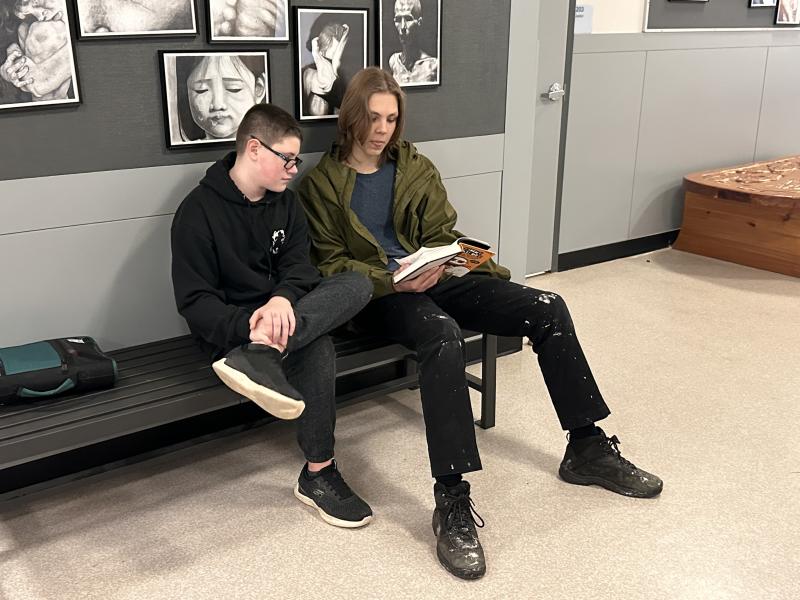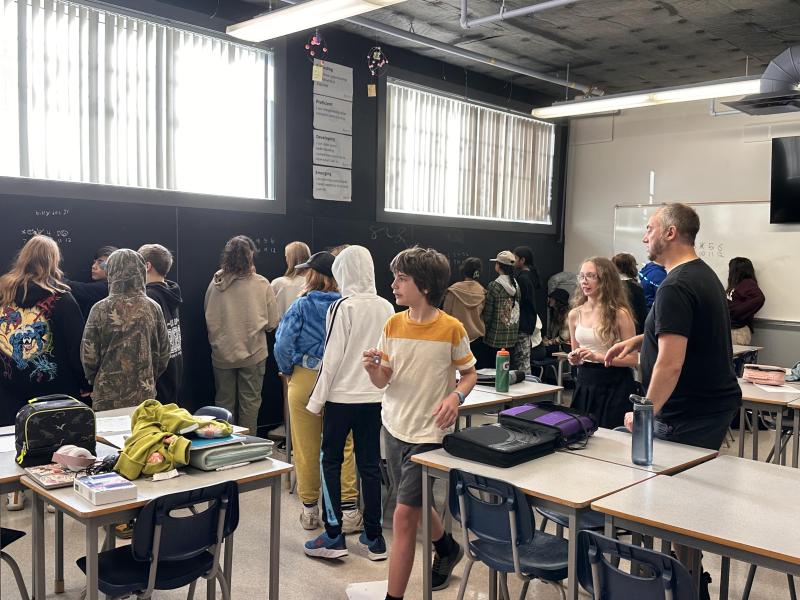Intellectual Development
Our students will learn key academic skills - like reading, writing and math - to encompass the knowledge and processes associated with intellectual development. As learners and meaning-makers, students take subject-specific concepts and content and transform them into a new understanding.
Goals
- Improve student success in literacy.
- Improve student success in numeracy.

The integration of arts into education provides students with a diverse set of intellectual skills that extend beyond the boundaries of artistic expression, offering practical applications in the real world. In the context of integrated arts education, students gain valuable intellectual skills through various mediums, fostering a holistic approach to learning.
Students engage in science exploration through hands-on experiments aimed at developing and enhancing their intellectual skills. One notable example involves investigating the coefficient of friction. Throughout the process, students acquire valuable intellectual skills in various domains.
Firstly, students develop critical thinking skills as they formulate hypotheses and design experiments to test them. The exploration of the coefficient of friction requires careful consideration of variables, experimental setup, and methodology. This encourages students to analyze problems systematically and think critically about the underlying principles of physics.
Secondly, the experimentation process fosters problem-solving abilities. As students encounter challenges and unexpected results, they must troubleshoot and adjust their approach. This iterative problem-solving cultivates resilience and adaptability, essential skills for navigating complex scientific inquiries.
Moreover, the hands-on nature of the experiments enhances practical skills. Students gain proficiency in using scientific instruments, measuring tools, and data recording techniques. This practical experience not only reinforces theoretical knowledge but also equips students with the skills necessary for future scientific endeavors.
Communication skills are also honed through collaborative experiments. Students often work in teams to conduct experiments, analyze data, and present findings. This collaborative environment fosters effective communication, teamwork, and the ability to articulate scientific concepts—a vital aspect of intellectual development.
Furthermore, theses hands on experiments contribute to a deeper understanding of the scientific method. Students learn to formulate testable hypotheses, collect and analyze data, and draw conclusions based on evidence. This process instills a foundation of scientific inquiry that can be applied across various disciplines.

Literacy stands as a central and prioritized focus within our school, reflecting our commitment to equipping students with the essential skills needed for academic success and lifelong learning. Our dedication to literacy encompasses a comprehensive approach that goes beyond the mere acquisition of reading and writing skills, aiming to cultivate a deep appreciation for literature, effective communication, and critical thinking.
Buddy reading between secondary and younger students proves to be a highly effective strategy for enhancing literacy skills while fostering a sense of community and connection. In this collaborative approach, secondary students engage in reading activities with their younger counterparts, leading to a multifaceted learning experience.
This not only improves literacy skills through modelling reading strategies, but has shown a significant increase in the engagement and motivation of our younger readers. Through the support and encouragement of their older buddies, younger students gain confidence in their reading abilities. The positive reinforcement from secondary students contributes to a sense of accomplishment, motivating continued efforts in literacy development.
Buddy reading promotes social interaction between students of different age groups. The collaborative reading sessions provide opportunities for conversation, teamwork, and relationship-building, contributing to the development of important social skills. Buddy reading creates a sense of community within the school environment. The interdependence between secondary and younger students fosters a supportive atmosphere where individuals feel connected and valued as part of a larger learning community.
Additionally, our older students often bring diverse perspectives and experiences to the reading sessions. This fosters cultural exchange and empathy, helping students develop a broader understanding of different backgrounds and fostering a sense of inclusivity. Buddy reading has proven to be a powerful tool for literacy development and community building. Beyond the immediate improvement in reading skills, this collaborative approach nurtures positive social dynamics, empathy, and leadership qualities, creating a rich and supportive educational environment for all involved.

The cultivation of math intellectual skills is enriched through the practice of group problem-solving. This collaborative method not only enhances students' mathematical proficiency but also fosters a range of cognitive and interpersonal skills crucial for real-world applications.
Group problem-solving encourages students to approach mathematical challenges with critical thinking and analytical reasoning. Through collaborative discussions and diverse perspectives, students learn to dissect problems, identify patterns, and apply logical reasoning to arrive at solutions. The group dynamic prompts students to articulate their thoughts and mathematical strategies clearly. By explaining concepts to peers, students refine their communication skills, ensuring they can express mathematical ideas with precision—a valuable skill in academic and professional settings.
Collaborative problem-solving instills a sense of teamwork and collaboration. Students learn to work collectively, leveraging each other's strengths and insights. This mirrors real-world scenarios where collaborative efforts are often essential for solving complex problems in various fields. Group problem-solving provides a platform for students to navigate differing opinions and resolve conflicts constructively. This skill is transferable to professional settings where effective negotiation and conflict resolution are integral to successful teamwork. Additionally, group problem-solving contributes to social and emotional learning. Students develop empathy, patience, and the ability to support peers in moments of challenge. These emotional intelligence skills are vital for fostering positive interpersonal relationships inside and outside the classroom.
Through group discussions, students engage in metacognition—thinking about their thinking. They reflect on their problem-solving processes, consider alternative approaches, and gain a deeper understanding of their own cognitive strategies, promoting self-awareness and continuous improvement.